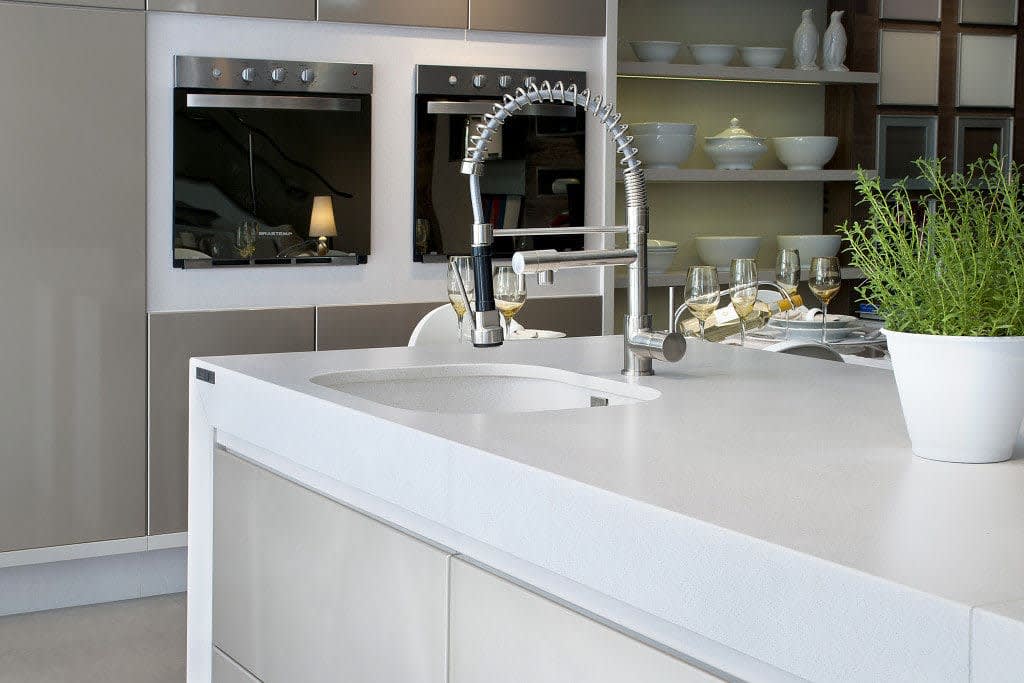What is the standard thickness for a kitchen countertop? The most common or standard kitchen countertop thickness is 1 1/4 inches (3 cm). However, kitchen countertop thickness options can vary depending on the material and desired aesthetic. This comprehensive countertop thickness guide will explore everything you need to know about kitchen countertop dimensions, including ideal countertop height and countertop overhang dimensions.

Image Source: images.ctfassets.net
Selecting the Right Countertop Thickness
Choosing the correct countertop thickness is vital for both the look and function of your kitchen. The thickness impacts the durability, cost, and overall design of your kitchen. Consider these factors:
- Material: Different materials have different structural needs.
- Aesthetics: Do you prefer a sleek, thin look or a substantial, thick appearance?
- Budget: Thicker slabs usually cost more.
- Support: Ensure your cabinets can support the weight of the chosen material and thickness.
Common Kitchen Countertop Thickness Options
While 1 1/4 inches is the average countertop thickness, many other sizes are available. Let’s look at some of the most common:
- 3/4 Inch (2 cm): A thinner option often used for less demanding applications.
- 1 1/4 Inch (3 cm): The standard and most popular choice.
- 1 1/2 Inch (4 cm): Offers a more substantial, luxurious feel.
- 2 Inch (5 cm) or More: Used to create a very thick, statement countertop.
The table below presents an overview of the different countertop thicknesses.
| Thickness | Millimeters (mm) | Centimeters (cm) | Inches (in) |
|---|---|---|---|
| 1/2 Inch | 12.7 | 1.27 | 0.5 |
| 3/4 Inch | 19.05 | 1.905 | 0.75 |
| 1 Inch | 25.4 | 2.54 | 1 |
| 1 1/4 Inch (Standard) | 31.75 | 3.175 | 1.25 |
| 1 1/2 Inch | 38.1 | 3.81 | 1.5 |
| 2 Inch | 50.8 | 5.08 | 2 |
| 2 1/2 Inch | 63.5 | 6.35 | 2.5 |
| 3 Inch | 76.2 | 7.62 | 3 |
Kitchen Countertop Materials and Thickness
The recommended countertop thickness often depends on the material you choose. Some materials are naturally stronger and can be used in thinner slabs, while others require greater thickness for support.
Granite Countertops
- Standard Thickness: 1 1/4 inch (3 cm) is the most common.
- Other Options: 3/4 inch (2 cm) granite is available, but it usually requires plywood support underneath, especially for larger spans.
- Considerations: Granite is heavy and durable. The average countertop thickness provides ample strength and resists cracking. For very large islands, a thicker slab might be desired for visual impact.
Quartz Countertops
- Standard Thickness: 1 1/4 inch (3 cm) is the industry standard.
- Other Options: 3/4 inch (2 cm) quartz is becoming more popular, offering a sleek, modern look. Again, it may require additional support.
- Considerations: Quartz is engineered stone, known for its consistency and durability. The standard thickness offers excellent performance.
Marble Countertops
- Standard Thickness: 1 1/4 inch (3 cm) is typical.
- Other Options: 3/4 inch (2 cm) marble is used less frequently due to marble’s inherent softness and potential for staining.
- Considerations: Marble is softer than granite or quartz and can be prone to scratching and etching. The recommended countertop thickness helps to minimize damage.
Wood Countertops (Butcher Block)
- Standard Thickness: 1 1/2 inch (4 cm) to 3 inches (7.6 cm) are common.
- Other Options: Thickness can vary based on design preferences.
- Considerations: Wood provides a warm, natural look. Thicker butcher block countertops are more durable and can be sanded down and refinished over time.
Laminate Countertops
- Standard Thickness: Varies, but typically around 1 inch (2.5 cm) to 1 1/2 inches (3.8 cm).
- Other Options: Laminate is made by bonding a decorative layer to a particleboard or MDF core. The thickness is usually determined by the core material.
- Considerations: Laminate is a budget-friendly option. While not as durable as stone, it comes in various colors and patterns.
Concrete Countertops
- Standard Thickness: 1 1/2 inch (4 cm) or thicker.
- Other Options: Thickness can be customized.
- Considerations: Concrete is highly customizable and can be cast in various shapes and sizes. Thicker countertops offer greater strength and a more substantial look.
Solid Surface Countertops (e.g., Corian)
- Standard Thickness: 1/2 inch (1.2 cm) is common.
- Other Options: Can be built up to appear thicker.
- Considerations: Solid surface materials are non-porous and can be seamlessly joined. Thinner slabs are often used, with built-up edges to create a thicker profile.
Impact of Countertop Thickness on Kitchen Design
The thickness of your countertop influences both the aesthetic and functional aspects of your kitchen.
Visual Impact: Thin Kitchen Countertops vs. Thick Kitchen Countertops
- Thin Countertops (3/4 inch or less): Offer a sleek, modern, and minimalist look. They work well in contemporary kitchens with clean lines.
- Thick Countertops (1 1/2 inch or more): Create a bolder, more substantial, and luxurious feel. They suit traditional, transitional, and rustic kitchen styles.
Structural Considerations
- Support: Thicker countertops generally require less support than thinner ones. Ensure your cabinets are strong enough to bear the weight.
- Overhang: Thicker slabs allow for a greater countertop overhang dimensions without additional support.
- Seams: For large countertops, consider how the thickness will affect the visibility of seams.
Cost Implications
- Material Costs: Thicker slabs usually require more material, increasing the cost.
- Fabrication Costs: Cutting and finishing thicker materials can be more labor-intensive.
- Installation Costs: Heavier countertops may require more manpower or specialized equipment for installation.
Ideal Countertop Height
Beyond countertop thickness, the overall height of your countertop is a crucial ergonomic consideration.
- Standard Countertop Height: The standard is 36 inches (91.4 cm) from the floor to the top of the countertop.
- Adjustable Heights: Consider adjustable-height countertops for universal design or if you have family members with varying needs.
- Island Height: Kitchen islands can be at standard height, bar height (42 inches), or a combination of both to create different zones.
Achieving Comfortable Countertop Height
- Consider the Primary User: The ideal height depends on the height of the person who uses the kitchen most often.
- Ergonomics: The right height reduces strain on your back, shoulders, and arms while working in the kitchen.
- Test It Out: If possible, test different countertop heights before making a decision.
Countertop Overhang Dimensions
Countertop overhang is the amount the countertop extends beyond the base cabinets. Proper overhang provides legroom for seating and prevents spills from running directly down the cabinets.
- Standard Overhang: A 1-inch overhang is typical for countertops without seating.
- Seating Overhang: For seating, a minimum of 12 inches of overhang is recommended for counter-height seating (36 inches high). For bar-height seating (42 inches high), 15 inches of overhang is ideal.
- Knee Space: Ensure adequate knee space beneath the overhang for comfortable seating.
- Support: For overhangs exceeding 12 inches, consider adding support brackets or corbels.
Recommended Overhang Dimensions by Seating Type
| Seating Type | Recommended Overhang |
|---|---|
| No Seating | 1 inch |
| Counter-Height Seating | 12 inches |
| Bar-Height Seating | 15 inches |
Deciphering Countertop Edge Profiles
The edge profile you select for your countertop can also affect its perceived thickness and overall style.
- Eased Edge: A slightly rounded edge, simple and versatile.
- Bullnose Edge: A fully rounded edge, soft and traditional.
- Beveled Edge: An angled edge, adding a touch of sophistication.
- Ogee Edge: An S-shaped edge, ornate and elegant.
- Waterfall Edge: The countertop extends vertically down to the floor, creating a dramatic look.
Edge Profiles and Thickness Perception
- Thick Edge Profiles: Can make a thinner countertop appear thicker.
- Simple Edge Profiles: Emphasize the actual thickness of the countertop.
- Consider the Overall Design: Choose an edge profile that complements your kitchen style.
Fathoming Countertop Installation Considerations
Proper countertop installation is vital for ensuring the longevity and performance of your countertops.
- Professional Installation: Highly recommended, especially for stone countertops.
- Cabinet Leveling: Ensure your cabinets are level before installing the countertop.
- Seam Placement: Plan seam placement carefully, minimizing their visibility.
- Support: Provide adequate support for the countertop, especially for large islands or overhangs.
- Sealing: Seal natural stone countertops to prevent staining and damage.
Choosing the Best Countertop Thickness: A Summary
Selecting the right countertop thickness involves considering several factors:
- Material: Different materials have different structural needs.
- Aesthetics: Thin countertops offer a modern look, while thick countertops create a bolder statement.
- Budget: Thicker slabs usually cost more.
- Support: Ensure your cabinets can support the weight.
- Overhang: Plan for adequate overhang dimensions, especially for seating.
- Edge Profile: Choose an edge profile that complements your kitchen style.
By carefully evaluating these factors, you can select the ideal countertop thickness for your kitchen, creating a beautiful, functional, and durable space.
Frequently Asked Questions (FAQ)
-
Can I use 3/4 inch granite for my countertops?
Yes, but it is generally recommended to provide additional plywood support underneath, especially for larger spans, to prevent cracking.
* What is the ideal overhang for a kitchen island with seating?A minimum of 12 inches is recommended for counter-height seating (36 inches high) and 15 inches for bar-height seating (42 inches high).
* Does countertop thickness affect the cost?Yes, thicker slabs usually require more material and labor, increasing the cost.
* How do I choose the right countertop height?The standard is 36 inches, but consider the height of the primary user and adjust as needed for ergonomic comfort.
* What is the average countertop thickness?The average countertop thickness is 1 1/4 inches (3 cm).
* Are thin kitchen countertops less durable?Not necessarily. The durability depends on the material. However, thinner slabs might require additional support.
* What are the advantages of thick kitchen countertops?Thick countertops offer a more substantial look, may require less support for overhangs, and can enhance the overall durability of the countertop.
* What should I consider when choosing kitchen countertop dimensions?Consider the size of your kitchen, the layout, the placement of appliances, and the desired functionality of the countertop. Also factor in countertop overhang dimensions.
* How to decide on recommended countertop thickness?
The recommended countertop thickness depends on the material you choose, the support system available and your own aesthetic preferences.

Hi, I’m Larry Fish, the mind behind MyGrinderGuide.com.. With a passion for all things kitchen appliances, I created this blog to share my hands-on experience and expert knowledge. Whether it’s helping you choose the right tools for your culinary adventures or offering tips to make your kitchen more efficient, I’m here to guide you. My goal is to make your time in the kitchen not only easier but also enjoyable! Welcome to my world of kitchen mastery!
